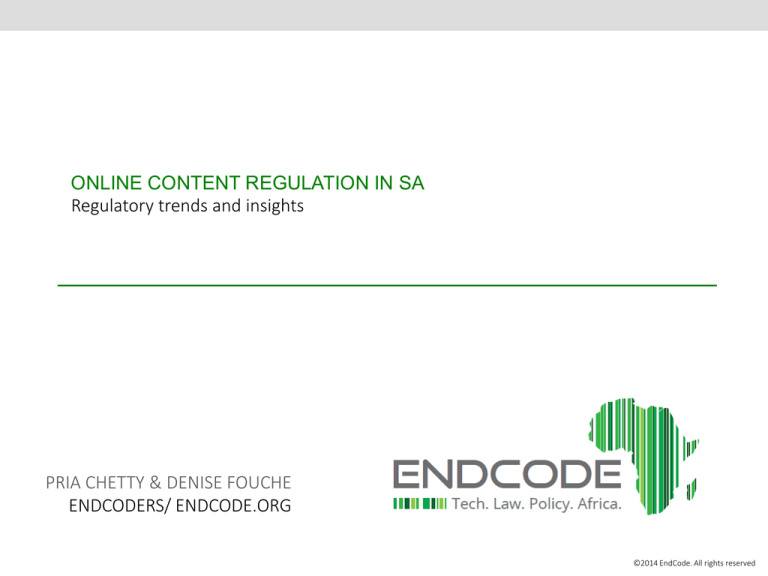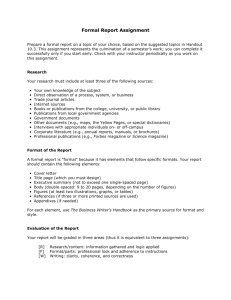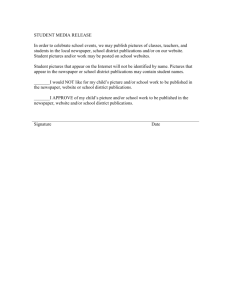
ONLINE CONTENT REGULATION IN SA
Regulatory trends and insights
PRIA CHETTY & DENISE FOUCHE
ENDCODERS/ ENDCODE.ORG
©2014 EndCode. All rights reserved
CONTEXT:
Trends in Online Content Regulation
Social Media
Digital Media in Africa
Net Neutrality
The FPB Regulation of Online Content
REGULATING ONLINE CONTENT:
MESSENGER AND METHOD
Monetising attention
“As wearable technology becomes ubiquitous in 2014, the amount of data created
will provide a treasure trove of insights for marketers. Not only does it let
marketers know where their customers are but when and how fast. Obviously
there is a huge risk here given the sensitivity of the data but the trick here
is for marketers to provide the right value in exchange for this invaluable
data.” Aaron Strout, Managing Director at W2O Group, co-author of Location-Based Marketing for
Dummies
So much content shared today is private, and it often disappears, so marketers aren’t readily
able to track and target such consumers. Expect marketers to explore new, creative ways of
reaching consumers who prioritize privacy.
David Berkowitz, Chief Marketing Officer of MRY
We already know that we don’t search for content now, content finds you. In 2014,
we’re going to start seeing how brands and products find you.
Ragy Thomas, CEO and founder of Sprinklr
New approaches needed
• Number of nations implementing regulatory measures is increasing. Google : more
than 25 governments have blocked its service since its inception, especially after 2002
• Increased regulation driven by privacy concerns and controlling “problematic” content
• Lack of industry consultation when proposing specialist legislation
http://www.slideshare.net/wenwenqi/internet-content-regulation-in-2010
International developments
• Privacy imperatives:
• Online behavioural advertising
• Awareness of data being used for marketing purposes
• Right to be forgotten
• Silent tracking: Device fingerprinting and cookies consent
• Real Time Bidding systems: right commercial communication to the right
person at the right time through the right device
• Applying approaches to indecent content vs extreme content
• 4 UK ISPs agreed to a system of filters for websites espousing extremist views
= automating the human understanding of context around words
• Pending legislation (US)
• Do-Not-Track Online Act of 2013
• Online Communications and Geolocation Protection Act
TARGETTING CONSUMERS.
WEBSITES. SOCIAL MEDIA
Websites. Social Media
• Responsible data usage
• EMOTIONAL CONTAGION. FaceBook’s Mood Experiment :
manipulation of 689 000 users’ homepages
• Electronic Privacy Information Centre files with the FTC (US)
• FB under a 20-year consent decree from FTC to protect user
privacy after findings of violations in 2012
“Facebook’s failure to adequately disclose that it shared consumer data
with third-party researchers constitutes a deceptive act or practice in
violation of Section 5(a) of the FTC Act. Facebook has violated Count I of its
2012 Consent Order with the FTC and is subject to FTC enforcement in
Federal district court.”
Websites. Social Media
• Facebook and Twitter instructed by Information Commissioner’s Office (UK) to
make data collection and usage practices clearer to members:
• Tick-box = informed consent with regard to varied ways data is being used by
by websites and apps?
• Reasonable reader of privacy policy
• Call on governments to set standards which organisations can sign up to,
promising to explain how they use personal data in clear, concise and simple
terms.
• ICO’s global survey of more than 1200 mobile apps found 85% failed to explain
how they were collecting, using and disclosing users’ personal information
To read or not to read?
Websites. Social Media
• Enforceability of Terms of Service agreements:
• Right to modify terms at any time and impose new or additional terms
• Continued use = compliance with contract
• EU enforceability of conditions without notification
• Notice has to be given and consumer must have a choice to cancel if terms
are no longer acceptable
• Heavy burden on the consumer
• Hidden unfair clauses likely to be deemed unfair
• Unusual or suprising terms to be pointed out specifically
DIGITAL MEDIA IN AFRICA
Doing Digital Media in Africa
• Demise of print
• New platforms; new opportunities
• Challenges for Africa:
• Infrastructure
• Slow internet connections
• Low multimedia skills
• Weak technological equipment
• Advantages
• Opportunity to learn from others’ mistakes
• Use what is working and develop it further
• Introduce useful methods used by other African countries
• Journalism’s meaning, identity and purpose in the digital era
Doing Digital Media in Africa
Current representation
Electronic Transactions
Botswana
Draft
Ghana
Kenya
Data Protection
Cybercrime (Computer Crime)
(Under Review)
Draft
Draft
Lesotho
Draft
Draft
Draft
Malawi
None
None
None
Mauritius
Mozambique
None
None
None
Namibia
Draft
Draft
Draft
Nigeria
Draft
Draft
Draft
South Africa
Swaziland
None
None
None
Tanzania
Draft
Draft
Draft
Uganda
None
Zambia
None
Zimbabwe
None
Cote d’Ivoire
None
Congo
None
Angola
None
None
Gabon
-
None
Rwanda
Ethiopia
Source: EndCode Executive Brief
None
Draft
Partial/Draft
None
None
-
NET NEUTRALITY
Net Neutrality
What kind of web do we want?
• Net neutrality essentially prevents ISPs favouring one kind of internet traffic over
another
• It forbids telecomms companies from blocking websites or providing priority to
certain content providers (usually for a fee)
• The Internet and the World Wide Web have been the source of rapid technological
innovation because they are structured in a neutral way
• New entrants
• Easy access to online resources
• If an ISP can pick its content providers and subsidise the data costs for that content
• It becomes harder for new entrants to come into the market
• Stifles innovation
• Stifles free expression
Net Neutrality
The Situation in the U.S.
• South African stage of development with regard to net neutrality is different to the
U.S.
• Telecomms companies in the US are trying to get laws passed so that they can
charge online content providers fees to make those provider’s sites faster on their
networks for their users.
• Big players like Netflix can afford to do this
• What effect will this have on small/new players?
• President Obama has written to the FCC asking them to protect Net Neutrality by
classifying the Internet as a “Utility” and making it subject to all rules that apply to
a “Utility”
Some net neutrality supporters believe this is not the right way to keep the
net neutral
• The decision is essentially up to the FCC
REGULATING CONTENT:
THE FILM & PUBLICATIONS BOARD
The Film & Publications Board Regulation
of Online Content
THE FILM AND PUBLICATIONS ACT
Regulates publications, film and games.
Film means “any sequence of visual images recorded in a manner that allows the images to be seen as a
moving picture…”
Department of Home Affairs 20 March 2014 Notice 184 Film and Publication Regulations
Regulation 23 Submission for review and possible classification
•
Submission of online content for classification through the Board Online Submission system
The Film & Publications Board Regulation
of Online Content
26 March 2013 the Chairperson of the Film and Publications Board, Thoko presented
the Board’s Strategic Plan for the Fiscal Years 2013/14 – 2017/18 to the
Parliamentary Portfolio Committee on Home Affairs.
•
•
•
•
Effective and visible monitoring of industry throughout the entire value chain (content
creators, producers and distributors of films, publications and games) for the
protection of children and adults through information;
Effective and innovative regulation of the content distributed on online, mobile and
related platforms for the protection of children and adults through information.
The Strategic Plan states that the FPB has established itself as the “authority in
classification” and that its mandate (derived from the Film and Publications Act) is to
regulate the creation, production and distribution of films, games and certain publications.
FPB’s mandate to regulate content at the creation stage extends the FPB’s powers to
determine the nature of the content published on various platforms. This conflicts with
fundamental constitutional rights, namely the freedom of expression (s16) and the freedom
of trade, occupation and profession (s22).
The Film & Publications Board Regulation
of Online Content
STRATEGIC OUTCOME 1
•
Effective and visible monitoring of industry throughout the entire value chain.
Apply generic regulation to online publications and problematically require the
re‐ordering of the natural tendencies that prevail in that sector.
Media creators, be it radio, video, magazines or newspapers (in print and
online), subscribe to processes and forms of industry regulation specifically
tailored to the nature of the publishing platform.
Content creation is not necessarily in the hands of media producers as
traditionally understood?
STRATEGIC OUTCOME 2
•
Effective and innovative regulation of the content distributed on online, mobile and
related platforms.
Inadequate consideration of the nature of content that is distributed on these
platforms.
The Film & Publications Board Regulation
of Online Content
THE FILMS AND PUBLICATIONS ACT
Publication
• The object of the Act: regulate the creation, production, possession, and
distribution of films, games and certain publications by means of
classification, the imposition of age restrictions, and giving of consumer
advice.
• The concept of “publication” is broadly defined in the Act and includes “any
message or communication, including a visual presentation, placed on any
distributed network, including but not confined to the Internet”.
• This broad definition does not consider the logistics, nature of, and technical
processes required to publish content on the Internet. The Act does not
sufficiently make provision for the variety of “publication” that occurs
online.
The Film & Publications Board Regulation
of Online Content
THE FILMS AND PUBLICATIONS ACT
Publication
• Is personal commentary to be considered publication?
• The Act does not take into account the nature of social media commentary
nor does it consider that such commentary may well be strategically created
or posted for commercial purposes.
Blogs, tweets, Facebook updates, live‐streaming of video and radio
content.
Pria Chetty
Pria.chetty@endcode.org
endcode.org
THANKS, QUESTIONS?
Denise Fouche
denise.fouche@endcode.org
endcode.org
References
• http://www.bbc.com/news/technology-22772321
• http://www.businessinsider.com/president-obama-thinks-the-internet-should-be-a-utility-2014•
•
•
•
•
•
•
11
http://www.pmg.org.za/report/20130326‐government‐printing‐works‐film‐and‐publication‐boar
d‐201314‐strategic
http://en.wikipedia.org/wiki/Net_neutrality
http://www.cyber‐rights.org/documents/clsr17_5_01.pdf
http://www.theguardian.com/technology/2014/nov/28/social-networks-personal-data-mps
http://www.dailymail.co.uk/news/article-2118688/PayPal-agreement-longer-Hamlet-iTunesbeats-Macbeth.html
http://www.slideshare.net/wenwenqi/internet-content-regulation-in-2010
http://www.economist.com/news/special-report/21574634-chinas-model-controlling-internetbeing-adopted-elsewhere-each-their-own


